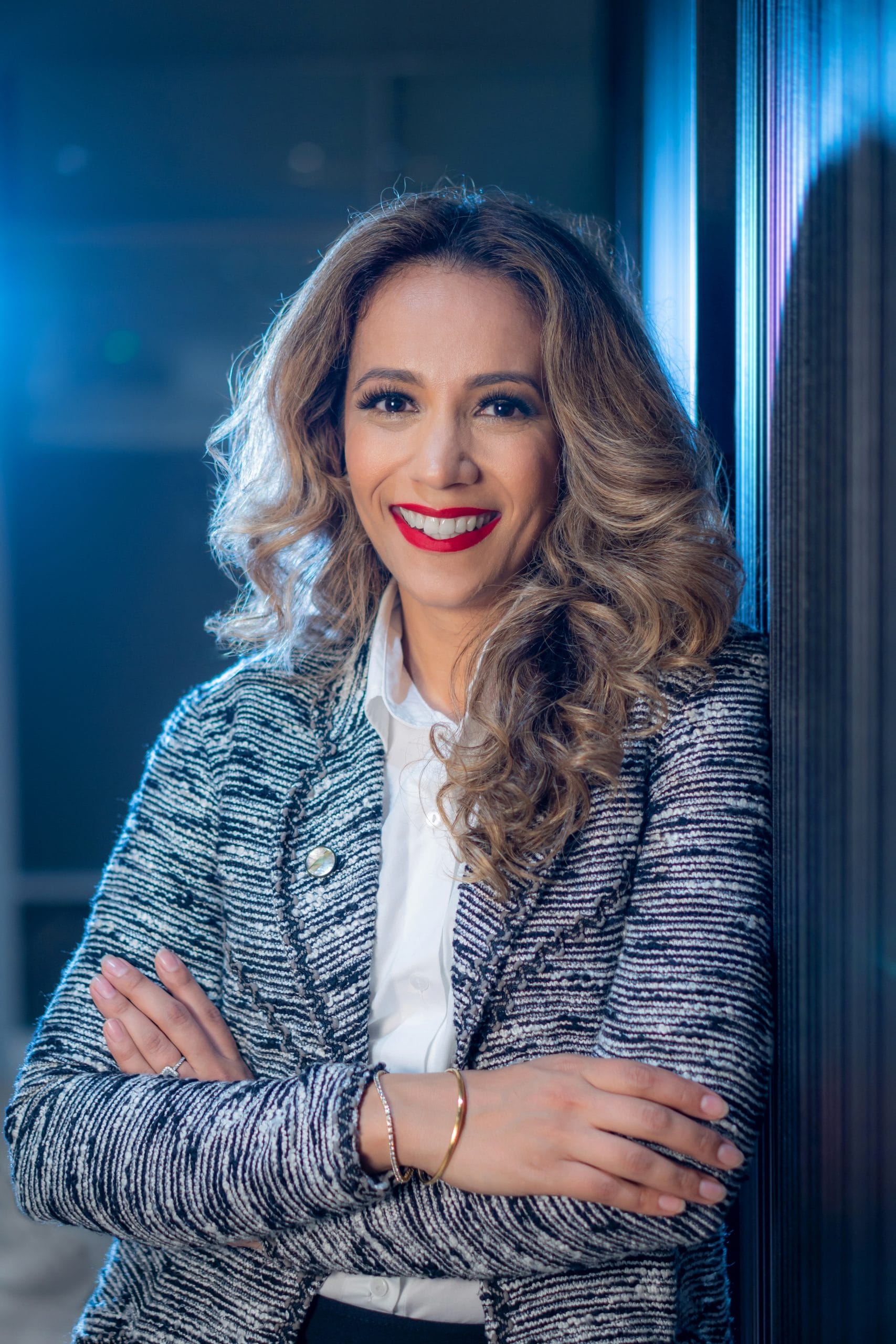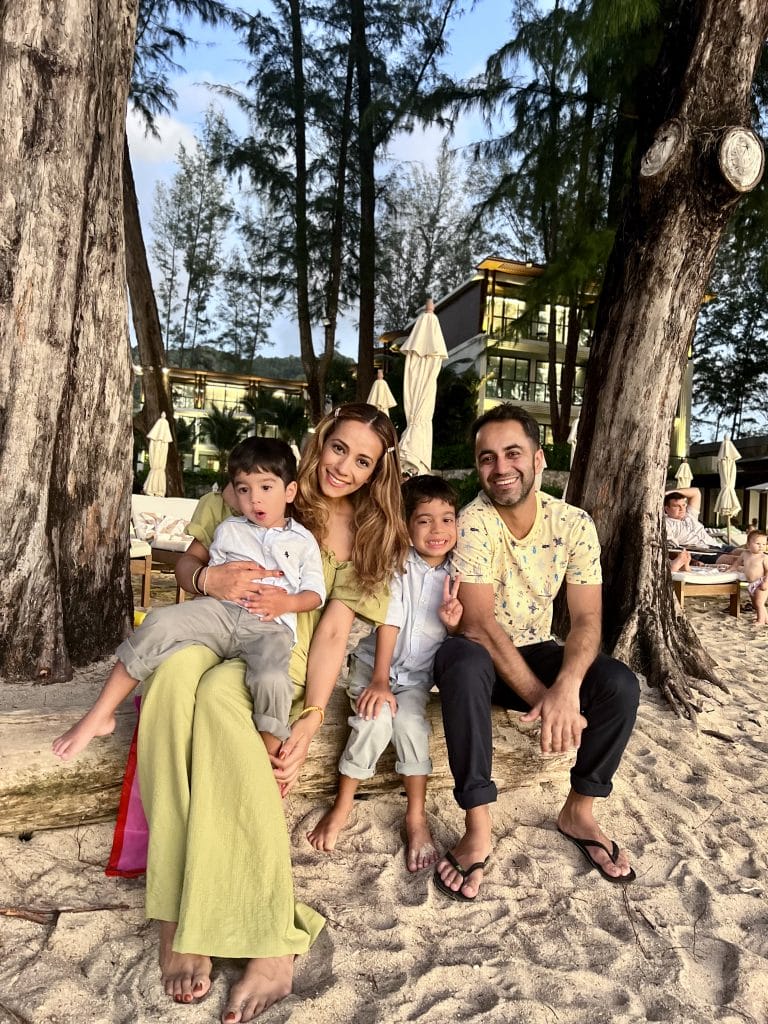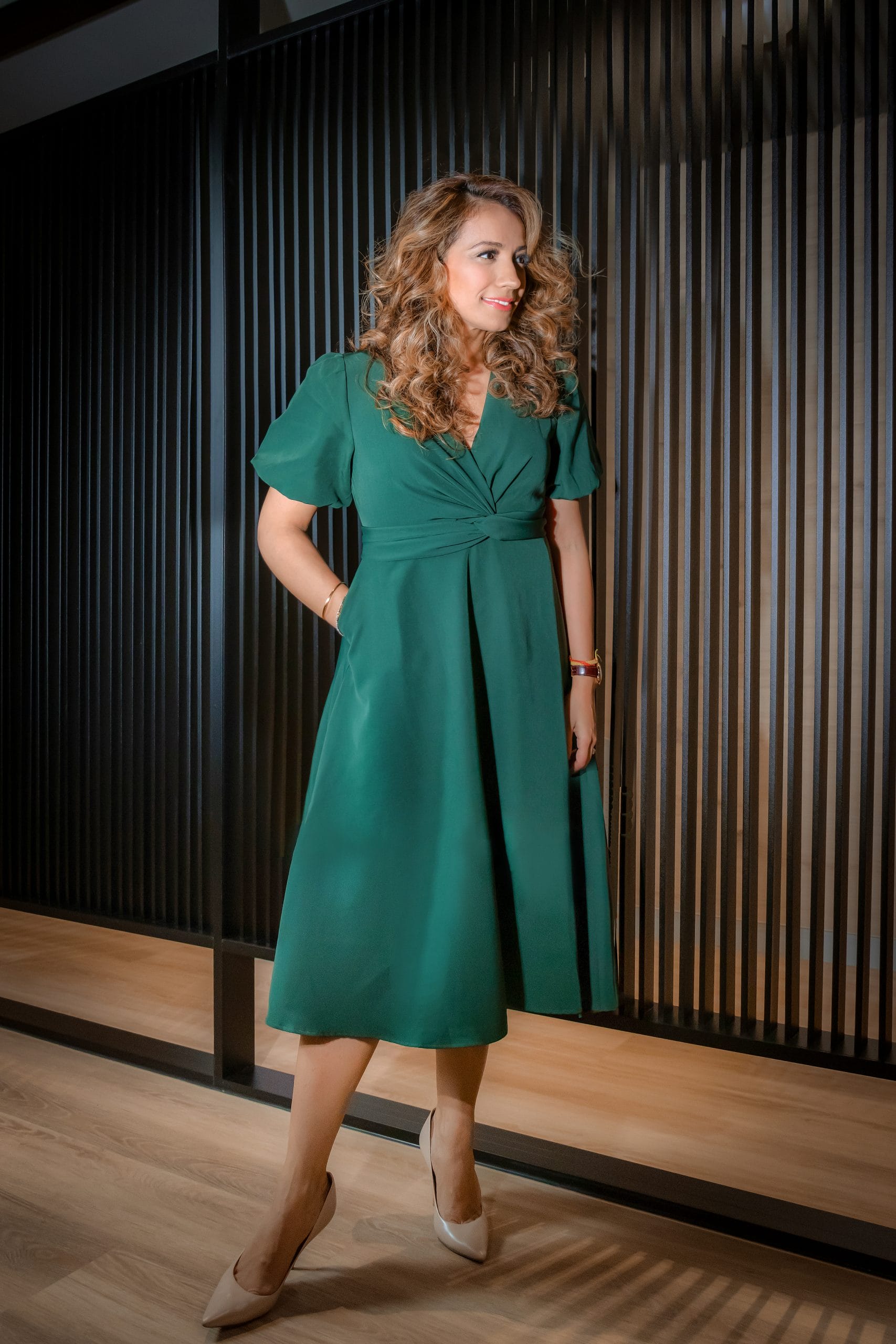How she puts stock in passion and positivity.
By Aiden Jewelle Gonzales
Pawana Koghar Chawla is, to this day, one of the rare breed of people I’ve met who is truly passionate about her job in finance, and who chose the industry instead of just falling into it – someone who puts the ‘fun’ in funds, as it were. But then again, I already knew Pawana was a rare gem, from how effortlessly she seems to juggle her high-powered career, motherhood, as thriving a social life as anyone in corporate can have, and keeping fit; to her charming and easy-going demeanour despite the lateness of the hour due to a not-unexpected rainstorm; to her approachable glamour and eloquence. I posit that she must have been one of those students growing up who achieved the holy trifecta in school – academics, sports, and a social life – and she laughs and ruefully admits that she was the captain of all three of the sports teams that she was part of in the International School of Bangkok (ISB). “I was also lucky to be a part of as close-knit a community as the Thai-Indian one, where everyone was either family or treated like one,” she says.
“That, together with the friends and experiences I made in ISB, forms a large part of my persona now.” The Assistant Managing Director, Head of Sales Trading & Execution at Kiatnakin Phatra Financial Group (KKPS), Pawana tells me how her journey to finance was not a direct one. “Upon joining Pepperdine University in the US, I had my sights set on Sports Medicine, building on my love of sports. After a few weeks, the rigours of the course diverted my interest. I found that a Finance major played into my inclination for numbers and financial news,” she reveals. Ever the over-achiever and fuelled by the competitiveness within any sportsperson, she completed her Bachelor’s Degree with a major in Finance and a minor in Non-profit within 3.5 years, just in time for front-row seats to Bear Stearns’ infamous collapse in 2008; a challenging time for a finance-industry neophyte.
She wisely chose to move back to Asia, and six months of narrowing down reputable institutions and a series of gruelling job interviews later, she joined Phatra Securities (now KKPS) as a Junior Trader for Derivatives, and hasn’t looked back since. “Although it was my first full-time work experience, it’s been the company’s continuous improvement culture, the team’s no-compromise ethic, and evolving development that have shaped how I handle new challenges today,” she enthuses. “It’s been 14 years with the firm, and I’m kept on my toes every day with new challenges. My bosses and colleagues, old and new, are what makes the team; they’ve all taught me very well and I would not be here without them.”
In our exclusive sit-down with Pawana, she talks to Masala further about her professional journey and what her career entails; offers financial insight; and also reveals that while her job description involves analysing the value of stocks and other financial instruments, what’s truly priceless is passion and positivity, and having family, community, and a team that supports you.
Your love for KKPS truly shines through, and as you’ve mentioned, being part of their team has become an indelible part of who you are now. What has garnered your loyalty for so long?
I am a firm believer that where you work shapes you. KKPS is a reputable firm that takes pride in being progressive in its outlook, and it values its employees. As a financial house, it has been duly awarded industry prizes, and the financial arm of the firm, compared to industry peers, has a strong international outlook. The team being built in our department is young, positive, and professional; this is important when working in a well-established industry. This complements the international education environment I grew up in.
What does it mean to be the Assistant Managing Director at the company, running the Sales Trading desk covering both local and foreign institutions?
The ABCs of it all is that I buy and sell stocks. The questions are, how do we do it, and who do we do it for? The team I lead is given the responsibility by both foreign and local institutions to trade the Thai stock market on their behalf. These institutions include, but are not limited to, pension funds, national sovereign funds, hedge funds, and quant funds. As a unit, the team has been responsible for approximately 18 percent of all trading volume moving through the Thai stock market year to date. This makes us the number one broker in Thailand by turnover.
The team works continuously to position ourselves to grow this. As the head of the desk, my role involves both executing the trade, whilst finding ways to grow our bottom line. We are now a multi-dimensional execution desk; offering several execution platforms as well as generating sales ideas to enhance our services. The team has also expanded from offering execution and sales trading for equity and derivatives, to enhancing the Stock Borrowing and Lending (SBL) facilities and a Quant Solution platform. This multifaceted approach is unique and has positioned us for growth.
So what goes into making those decisions, and what kind of skills have you had to develop over the years to succeed in this position?
Dealing with figures that are time and value sensitive requires attention to detail. In a large sense, the market reflects people’s sentiment, both positive and negative. In the same manner, urgency may accelerate with a rally, and panic might be encountered when the market goes through a trough – both situations require a level head. These skillsets – attention to detail and a level head – have been developed through experience.
As a dealer, I have gone through the Great Recession (2008 to 2009), Europe’s Debt Crisis (2009-2019), Quantitative Easing (QE), COVID-19 (2020 to now), and the more contemporary Russian-Ukraine War, alongside the inflationary battles taking place globally. Working through these experiences has been key in building the confidence that allows me to excel in this intense environment.
Based on your unique expertise, what advice would you give for someone who wants to start investing – what resources are available, and which ones would you personally recommend?
Investment is a very personal choice, and I would say it is good to keep in mind that risk is factored into the potential percentage return. A higher return potential will have more risks; if it is too good to be true, it normally is. It is always good to do your own homework; financial literacy is something we should educate kids in, from a young age. There are a multitude of platforms available – as a plug, KKPS just launched a new digital platform for retail investors called DIME. DIME currently offers investors access to the US market with minimum investment of THB 50. You can download the app today and start trading!
What is the most cogent financial advice that you can give to people in the community, especially based on your experience as someone within the community yourself?
Investing is like any skill; it takes time to develop. Have a varied portfolio that suits your risk appetite. Trends are called trends for a reason, stay vigilant that they will come to an end. Always do your own homework and try to find like-minded people with the same investment philosophies, with whom you can talk through your strategies. There are a multitude of thought leaders online, find one that makes sense for you – gravitate to those that discuss ideas in simple, logical terms, and shy away from those who over-promise and over-complicate.
You’ve been leading your team for years now – what is the most important discovery you’ve made as a leader?
I found that being a leader requires a varied perspective. Perspective of seeing the bigger picture, whilst doing to the day-to-day tasks. Perspective of guiding colleagues to the end goal. Perspective of knowing that going the extra unrewarded mile today sets the tone of professionalism for tomorrow. Being open to learning and open to ideas is key to being a leader, and being able to filter and execute the right ones make you a good leader. I also believe that giving and receiving constructive feedback builds a strong, trusted, and motivated environment. I like to lead by example; setting a high standard for the team and helping individuals maintain this standard is important.
You’ve achieved so much over the years – which ones are you particularly proud of, and how do you overcome challenges when success is not immediately within reach?
I’m proud of being able to build a family whilst progressing in my job. It was not easy, especially in those first few months of motherhood, and this wouldn’t have been achievable if not for the people around me. My parents always believed in hard work, and they’ve always supported me being in the workplace; whether as a new graduate, new mother, or second time mother.
Meanwhile, there are daily struggles, and then there are life struggles. I think for me the best thing to do is make a list! I survive on making lists, I love a good pencil-and-paper type of list. Physically crossing off tasks on the daily struggles list gives me the satisfaction of managing them.
As for life struggles, I always have the philosophy of ‘just keep moving forward.’ Staying as optimistic as possible is the best attitude to have when overcoming struggles. There are always people who have it better, and people who have it worse, but everyone has their battles and having an optimistic outlook can only help.
Have there been gender-related barriers or roadblocks in your career in this male- dominated field? What do you as a woman uniquely bring to the table, and should more companies have women at the top?
Whilst there may be gender biases in the industry as you have posed, I have been fortunate not to experience them. Working at KKPS has been critical to this. When I joined, women leadership was the norm in the department. The firm also fuelled internal growth of its employees, never closing any doors or opportunities. Finance being a numbers game, your success is easily quantified, and in turn, rightfully rewarded.
As a woman, I believe I bring finesse, attention to detail, patience, a level-head, and perhaps a maternalistic form of management to the team. From a macro perspective, women-led countries during the COVID pandemic fared better, there may be some food for thought there. In fairness, I would like to take a different angle to this question – I believe companies would benefit from hiring the best person for the job, no matter the gender.
So how can we as women support each other in our careers, or in general?
It is important to be around people who are like-minded. Positivity and optimism are an important underlying persona for those looking to support each other.
I want to make it clear that there are full-time mothers out there that put in the hours in a very professional manner at home; I respect their opinions and count on their support as much as I would women in business. Being able to talk about the obstacles and celebrate achievements with peers is a big character boost. We can be consumed in our routine and often it’s necessary to remove yourself just to see the bigger picture; a supportive friend can really help you do that.
Tell us a little about the people who’ve inspired you, and why.
When it comes to people who inspire me, I look at those that are around me; be it friends, family members, or colleagues. I do not think you need to look far. I take inspiration from my kids achieving milestones, family members overcoming obstacles, seeing friends and colleagues being their best selves. Seeing those closest to me overcoming everyday struggles to reach a bigger goal is inspiring enough for me.
The million-dollar question: as someone in corporate, what does a work-life balance look life for you, and how do you maintain it?
Honestly, it’s tough whilst working a full-time, demanding job, but I knew I wouldn’t have a 50/50 life balance from the start. Given the long hours, I focus on quality over quantity. My colleagues understand the importance of having a such a balance and together, we try and support each other to reach those goals. I personally try to put my kids to sleep every night, even if it is just seeing them a few minutes before lights out. When I take time off work, I make a conscious effort to give full focus on personal wellbeing.
As the saying goes; it takes a village to raise a child, and I am fortunate to have a supportive husband and family when it comes to raising my sons, Tejas and Agastya. I honestly owe a lot to them; knowing that they are there allows for a sense of stability, which in turn allows me to pursue my work goals without hesitation.
I’m also a big sportsperson, so I use exercise and fitness to help maintain that balance. I wake up at 5am and train with a personal trainer at 5.30am, and I’m lucky that I have a partner who likes to do the same thing; we challenge each other in this.
Finally, what advice would you give to the next generation of female go-getters and leaders?
As cliché as it sounds, anything is possible. During my first few years at KKPS, I had a very strong woman team leader. She was a mother of two and I saw her manage both work and life. I often find myself thinking of her when looking for that confidence and belief that I can do it all. I have been fortunate enough to work in a progressive environment surrounded by forward-thinking leaders, both woman and men, from whom I still currently and constantly seek advice, and who take pride in nurturing talent that subscribe to the same thought process, regardless of gender. The next generation of leaders should look to foster this same positivity, within and around them. As advice, I would say find or build a space that works towards growing who you are. We are all capable of achieving our goals; you just have to want it enough.









